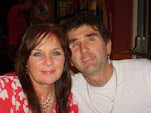Ian Kendall discovered a reeling male SAVI'S WARBLER in the Lee Valley Park (Hertfordshire/Essex border) late evening on Thursday 30 April. It was reeling from the extensive reedbed on 70 Acres Lake at TQ 367 031 and sang constantly from 1900-2100 hours. Although all of 70 Acres Lake is currently claimed by Essex County Council, with the new border now following the canal, for a very long period prior to this political change the border followed the River Lee, almost a mile to the east - so in essence, this bird is politically Essex at this time but may revert back to Hertfordshire later in the future (I tend to agree with Graham White and Adam Wilson and others that for constant recording of birds in this area, we stick with previous arrangements, particularly when one considers the many years of data collated from Cheshunt GP in the Hertfordshire Bird Reports).
The bird was seen well by Mike Ilett and Phil Ball early the next morning and reeled almost continuously from 0400 to 0900 hours, becoming more and more intermittent to late morning. It became quite for most of the day but then started up again in the evening, and reeled fairly constantly from 1800 to 2100 hours. It was seen briefly on a number of occasions (LGRE et al).
This same pattern of events has continued on subsequent days with the bird still present on Sunday evening (3 May).
DIRECTIONS: Although 70 Acres Lake is served by two public car parks - at Fishers Green at TQ 378 032 and at Hooks Marsh at TQ 376 026 - please note that these car park gates are locked at 1930 hours promptly each evening and do not open until 0915 in the morning. Obviously with the Savi's Warbler being mainly crepuscular in its activities, it is best to park just outside the gates. More convenient is Cadmore Lane, beyond the railway (accessed from the A10 and Cheshunt High Street).
For Fisher's Green car park, leave the M25 at Junction 25 and continue north on the A10 to the first Waltham Cross roundabout. Turn right here on Winston Churchill Way to the next roundabout and traffic lights. Continue right at the roundabout on to Monarch's Way and at the next roundabout continue east on the A121 Eleanor Cross Road towards Waltham Abbey. After several sets of traffic lights and a McDonalds restaurant on your right, you will come to the Abbeyview roundabout and bypass. Continue round this until you reach the B194 in Waltham Abbey where you head north towards Holyfield. After 1.4 miles, turn left on the sharp bend towards Hayes Hill Farm and Lee Valley Park car park.
Once at the Bittern Watchpoint Hide (just across the bridge from the car park), follow the towpath west for 400 yards and then skirt left down the line of Poplars with 70 Acres Pit on your left and the canal/river on your right. After a further 250 yards you will eventually pass the lock and reach Post 24 and from gaps in the hedge 85 yards further south, the area of reeds and Willows from which the Savi's is reeling from can be overlooked. The bird is some 70-90 yards out in the reedbed and very difficult to locate. If it is calm weather, it may climb to just below the tops of the reedbed and be 'scopable. A 'scope is essential for viewing.
Previous Hertfordshire Records of Savi's Warbler
1) A male was reeling at Stanstead Abbots GP from 22nd-27th April 1979 (Howard Medhurst et al) (Birds in Hertfordshire 1979: 18)..
2) A male was reeling from a small island in 70 Acres Pit on 20-21 May 1981 (D.N.Clayden, John Fitzpatrick, M.J.Oakland et al) (Birds in Hertfordshire 1981: 49).
3) A reeling male at Rye Meads Sewage Farm from 2-5 May 1989 was trapped and ringed on 3rd (C. Cottrell) (Hertfordshire Bird Report 1989: 447)..
4) An adult male was trapped and ringed at the constant effort site at Wilstone Reservoir, Tring, on 14 July 1989 and found to be wearing a BTO ring (number E707693). Most remarkably it had been ringed just two months earlier (on 9 May 1989) at Brandon Marshes in Warwickshire (81 kms to the NW) and constituted the first ever control of Savi's Warbler in Britain (J.K.Baker, W.J.Peach & G.M.Tucker) (Hertfordshire Bird Report 1989: 447).
Monday, 4 May 2009
Subscribe to:
Post Comments (Atom)

No comments:
Post a Comment